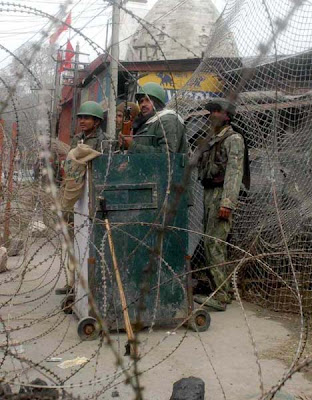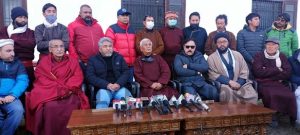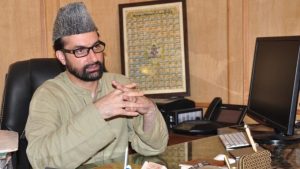
Dotted with Security Bunkers & Frisking Points, Kashmir has ‘Returned to the Nineties’
Locals, political observers, and opposition parties say that the increased presence of security forces is disrupting lives and fuelling resentment
By: Auqib Javeed
When 65-year-old Mohammad Ramzan was recently passing through the Lal Chowk area of Srinagar—the summer capital of Jammu and Kashmir, he witnessed the “return of the nineties” in Kashmir.
“Stop and check” by security forces was routine back then when armed insurgency was on the rise in the valley.
Ramzan, a businessman from the Bandipora area of North Kashmir, remembers people standing in long queues with hands up in the air, waiting to be allowed to pass after frisking.
The city was dotted with barricades and bunkers with security forces holding assault rifles.
“Those dark days are back,” he laments.
According to media reports, the deployment of security forces began around August 5, 2019, when the abrogation of Article 370 was announced.
For example, ahead of August 5, 2019, 380 companies of central forces were deployed in Kashmir valley; in July 2020, another 100 companies were rushed in; and this November, another 50 companies were deployed.
In a first, this October, the government allotted 65 acres across 10 locations in the volatile south Kashmir to Central Reserve Police Forces (CRPF).
In another first in twenty years, a team of female paramilitary troopers has been deployed in Lal Chowk, the commercial heart of Srinagar, to facilitate the frisking of women and children.
Suspicion being placed on women and children is another reminder of the nineties, say locals.
Earlier this month, residents of the capital city were left fuming when the J&K administration decided to house CRPF personnel in community halls where marriages and vaccination drives are usually held.
Gulzar Ahmad, who runs a grocery shop in Lal Chowk, says that business has been affected by this increased scrutiny. “The city is dotted with bunkers and frisking points, so people don’t want to venture out to shop,” he says.
After militants’ murderous attacks on civilians and particularly workers from out of state in October, tourists have stopped coming too, he says. “They don’t come to Srinagar now, and instead head to Gulmarg, Sonamarg, Pahalgam, and other tourist resorts,” he says.
This October, there was a worrying escalation of violence. The region witnessed 40 killings including 12 civilians, turning the month into the bloodiest since August 5, 2019.
Public Relations Officer of CRPF, Pankaj Singh tells Moneycontrol that the situation has turned “volatile” following the targeted killing of civilians in early October.
“You need to understand that CRPF is a federal police force, so whenever there is a deployment, it is being done on the requisition of the state administration,” he says.
Fear of alienation and violence
Political pundits and regional parties are lashing out at what they call the “fake” narrative of “return to normalcy”, which they say is being spread by the Bharatiya Janata Party-led government.
The government statistics show a fall in the number of terror incidents. According to data from the Home Ministry, Kashmir had reported 614 terror incidents in 2018, while the number reduced to 244 in 2020. It’s a drop of more than 60 percent.
But opposition parties and neutral observers say that this does not capture the resentment people feel.
“Post revocation of special status, the situation has become dicier and more critical. People feel short-changed and are sulking,” says Nizamuddin Bhat, a senior leader of Peoples Conference (PC).
Peoples Democratic Party’s Mohit Bhan says all the repressive measures, including nocturnal raids, seizure of bikes, frisking of women and children, and internet blackouts, are bound to increase estrangement of people. “Especially when you are looked at as a troublemaker, irrespective of your job, association, or ideology,” he tells Moneycontrol.
“If you say that public anger is building up, then you will be accused of terrorism and be charged with UAPA,” says Ifra Jan, additional spokesperson, National Conference (NC). “If and when there will be a public outburst, BJP will cry ‘radicalisation’,” she says.
While opposition parties and locals say that the situation is reminiscent of the nineties, Professor Noor Ahmad Baba says that it is worse than it was then.
A political scientist from Kashmir, says, “Any such (security) arrangement from the administration means that the authority structure is weak.”
Baba believes that the peace process that was started by the late Atal Bihari Vajpayee during his prime ministership has taken a beating.
“Things had started improving soon after his peace initiatives and the region was relatively calmer. But since his demise, we haven’t seen the peace process being carried forward and therefore things are getting worse,” he adds.
Another political commentator, Majid Haideri says arrests of youngsters, curbs placed across the city, and frequent, unannounced shutdowns of internet services are symptoms of things getting worse.
BJP’s UT spokesperson Altaf Thakur dismisses talk of the valley returning to the nineties.
“There has been no pelting of stones, no protests by separatists since August 5,” he says.
But he does acknowledge the unusual rise in security presence.
“The militants aren’t able to attack the security forces so they are going after soft targets such as civilians. What is wrong in building bunkers to protect civilians,” he asks.
But, as Haideri observes, “A bunker and increased deployment of security forces can’t be indications of peace.”
PC’s Bhat says that what is urgently needed is the act of rebuilding confidence. “The onus is on New Delhi to heal the bruised psyche of the masses here,” he says.

